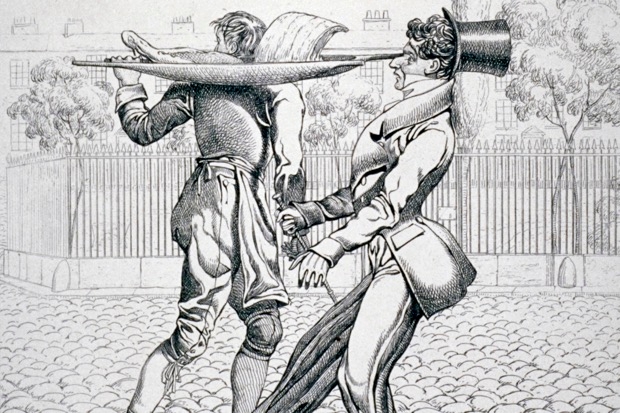I had thought that the saying ‘Accidents will happen in the best regulated families’ was a vulgar reference to children born unexpectedly. The Oxford English Dictionary records accident being used in just that way in the middle of the 19th century. On its own, ‘accidents will happen’ dates from at least as far back as 1705, and the Lady’s Magazine for 1791 gave this humorous version: ‘Mistakes will happen in the best regulated families; I have taken my opera fan to church.’ Ever since, it has been in common use, with Mr Micawber (1850) taking it up as ‘Accidents will occur in the best regulated families.’ You’d think it might have originated in a play or poem, but no such origin has been traced.
I had been thinking about accidents after passing a building site in Victoria Street, London, with a sign: ‘Incident and injury free’. It was not an offer to supply these things free of charge but an aspiration to be free of them. Incident was clearly preferred to accident. The police too speak not of traffic accidents but of incidents or collisions. They don’t want to concede that anything was unintentional or done without negligence.
Incident as something that simply happens has been in use since before Defoe’s time. But it has meanings unsought by managers of building sites, such as ‘an event, sometimes comparatively trivial, which precipitates political unrest, open warfare, etc.’ — like the Agadir incident in 1911, known in Germany as the Panthersprung after the gunboat Panther that was sent. There are no gunboats in Victoria Street.
Nor are incidents expected in incident rooms, which, as television police dramas show, merely examine criminal incidents. During the second world war, people had grown used to talking of ‘air raid incidents’, and violent arguments were given the same designation. Eric Partridge, the lexicographer of slang, declared that ‘if a businessman speaks of incidents when he means quarrels, he has been influenced by journalism’. It was like the current euphemism of challenge for problem. Yet today I’d expect a reference to a stabbing as an ‘incident’ on a yellow police notice-board in the street, not in a piece of yellow journalism.





Comments